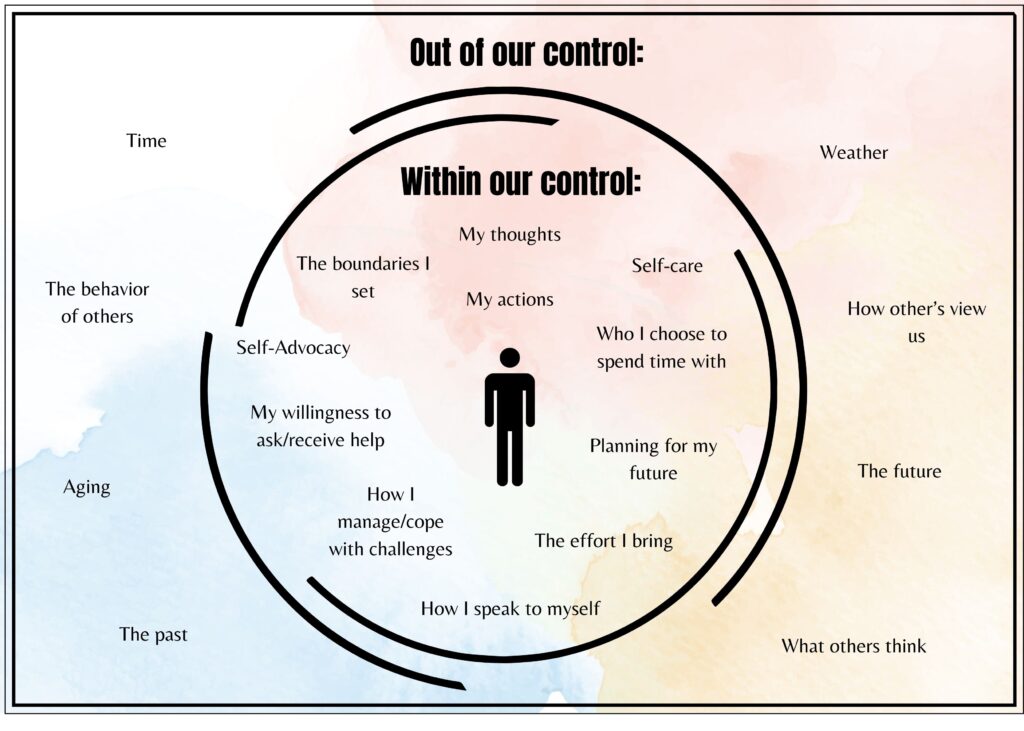Living with multiple sclerosis (MS) frequently comes with unique challenges, and taking control of our lives looks different for everyone. Those who have a sense of control over their life are more likely to take ownership and make the necessary changes to better manage their well-being. On the other hand, if we believe that things are completely out of our hands, we may be less motivated to make healthy changes and harbor feelings of hopelessness. While MS can be unpredictable, there are many ways we can regain and maintain a sense of control over our lives and take a proactive approach to our health.
It is crucial to recognize that there is a difference between what is in and out of our control. While we can influence our thoughts, emotions, and behaviors, we can’t always control our bodies, others, time, or our environment. The illustration below represents those things that are typically within our control and some things that may be out of our hands.
Things that are within our control include:
- Our thoughts and emotions – MS can negatively impact the way we feel and the choices we make. While someone feeling empowered and in control can make healthier choices like going for a walk or taking some time to rest, others may have a harder time making the necessary changes to manage their symptoms. There are a variety of tools, techniques, and resources that can help us manage emotional challenges. Psychotherapy, or talk therapy, can help individuals with a wide variety of psychological conditions and emotional difficulties. It can teach us new tools to add to our toolkit which help us navigate challenges more effectively.
- Self-care – Prioritizing ourselves is vital to our well-being. Make sure you carve out some time for yourself even when you are extremely busy. It can look like taking a 15-minute uninterrupted coffee break and using this time to check in with yourself. Take a moment to focus on how you are doing physically, mentally, and emotionally. Self-care can look different for everyone; it can be as simple as giving yourself permission to say “no” to something you don’t want to do.
- Self-Advocacy – Advocating for ourselves is important in shared decision-making. Know your rights, speak up if you have questions, ask for an explanation in simple terms you can understand, have your questions ready for your appointment, learn about treatment options, stay up to date with the latest research, and don’t be afraid to seek a second opinion. Keeping a record of your symptoms and side effects and discussing these with your doctor can facilitate the process. MSAA’s free mobile app, My MS Manager™ Mobile App, offers individuals a convenient and effective tool to manage the ever-changing course of the disease.
- Choose who you spend time with – Choose to spend time with those who support you, those who try to understand your needs, and respect your unique experiences. Staying social may vary depending on your preferences and health needs. Allow yourself time to rest and reschedule outings when needed. Communication with your loved ones is key. Take full advantage of the time you are feeling your best to schedule social activities; sometimes spontaneous plans are the most fun.
- The effort we make/ our actions – The commitment and the effort we place on our goals are within our reach. Planning without effort and follow-through is just wishful thinking. We can try new recipes or foods that are healthier, explore exercise options to find a workout routine that works well for us, or simply focus on reducing how frequently we indulge in certain things. Small changes can make a big difference.
- How we speak to ourselves – The way we speak to ourselves can be empowering or detrimental. We often overlook the importance of being kind to ourselves and how this can impact other aspects of our lives. Negative self-talk can contribute to self-doubt and hopelessness. Positive self-talk can promote feelings of empowerment when making treatment decisions, making better choices, and taking a proactive approach to our health.
- Our willingness to ask/receive help – Recognizing when we need help and being open to receiving that help is powerful. It can be difficult to admit when we need assistance, but seeking resources and support can be simple. Consider a support group, calling a supportive friend or relative, or calling a helpline. Asking for help can be the bravest first step you can take. You don’t have to do this alone; we all need each other.
- The boundaries we set – Setting healthy boundaries and respecting them takes practice. It is not enough to set boundaries; we must follow through with them and remain consistent. Setting a boundary sounds like, “I don’t feel comfortable with that, if you continue to do that I will leave.” You cannot control what others do, but you can control your response.
We may not have control over certain things like what others think, the climate, and our body’s response to certain treatments, but we do have the power to shape our own story from now on. It is natural to feel frustration or hopelessness when faced with things we cannot control, but there is always a choice. We hold the power to make choices about our bodies, medical decisions, and lifestyles. Every day is a new opportunity to invest in ourselves.
What does taking control of your life and your health look like to you? Do you have any tips or tricks that have helped you take back control and manage your well-being?


